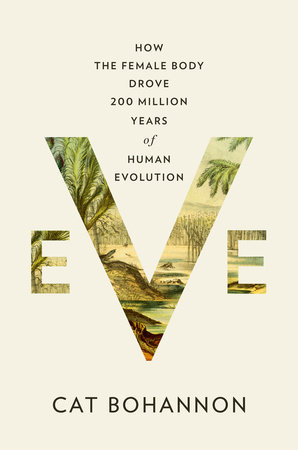Review of 'Eve' on 'Goodreads'
5 stars
"Eve" by Cat Bohannon offers a comprehensive and compelling re-examination of human evolution, emphasizing the significant role of the female body in shaping our species' evolutionary history and societies. Drawing upon disciplines such as evolutionary biology, physiology, palaeoanthropology, and genetics, Bohannon challenges the long-standing male-centric narrative of human development and brings attention to the contributions of the female body.
The book begins with a captivating tour of mammalian development, tracing back to the Jurassic era. By emphasizing the role of women, Bohannon provides an alternative narrative that sheds light on the often overlooked aspects of human evolution. Through this lens, she presents a new history of our species, one that highlights the evolutionary significance of the female body.
One of the primary goals of "Eve" is to challenge stereotypes and encourage readers to reconsider traditional narratives. Bohannon highlights the limitations of evolutionary reasoning that have perpetuated male-centric views. By doing …
"Eve" by Cat Bohannon offers a comprehensive and compelling re-examination of human evolution, emphasizing the significant role of the female body in shaping our species' evolutionary history and societies. Drawing upon disciplines such as evolutionary biology, physiology, palaeoanthropology, and genetics, Bohannon challenges the long-standing male-centric narrative of human development and brings attention to the contributions of the female body.
The book begins with a captivating tour of mammalian development, tracing back to the Jurassic era. By emphasizing the role of women, Bohannon provides an alternative narrative that sheds light on the often overlooked aspects of human evolution. Through this lens, she presents a new history of our species, one that highlights the evolutionary significance of the female body.
One of the primary goals of "Eve" is to challenge stereotypes and encourage readers to reconsider traditional narratives. Bohannon highlights the limitations of evolutionary reasoning that have perpetuated male-centric views. By doing so, she urges us to recognize the essential role of women in shaping our society and future.
Throughout the book, Bohannon explores various aspects of the female body that have influenced human evolution and continue to impact contemporary society. Pregnancy, breastfeeding, cognitive differences, menopause, and other biological factors are thoroughly examined, emphasising their significance in shaping our species. By delving into subjects such as midwifery, gynaecology, and prenatal care, Bohannon highlights the biological and social adaptations related to the female body that have contributed to our survival and flourishing as a species.
In her analysis, Bohannon also addresses the historical bias in scientific research, which has often prioritised male bodies and excluded female bodies from studies. This biased approach has resulted in an incomplete understanding of human evolution and health. By shedding light on this issue, Bohannon calls for a more inclusive and comprehensive approach to scientific research, highlighting the importance of considering both male and female bodies.
Bohannon's insightful analysis of the evolution of our culture emphasises the profound influence of traits such as problem-solving, collaboration, and storytelling. She suggests that the evolutionary forces and the role of the female body in shaping these traits have played a pivotal role in our shared human experience.
Through extensive research and engaging storytelling, Cat Bohannon challenges traditional beliefs and assumptions and encourages us to recognise and celebrate the strength and the essential role of women in our evolutionary history. "Eve" serves as a reminder that our shared history is a tapestry woven by the remarkable influence of women throughout time.

